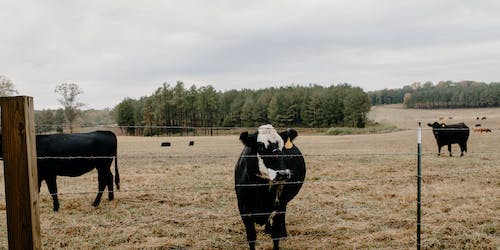Delve into the world of farm and ranch insurance, which sheds light on how it works and why it’s an essential shield for those who own vast stretches of land. Farm and ranch insurance is comprehensive insurance coverage that combines personal and commercial protection for farmers and ranchers. It covers various aspects of a farm or ranch, including the property, equipment, structures, and liability coverage. By having the right insurance coverage, farmers and ranchers can protect their assets and livelihoods from potential risks and losses.
Farm and Ranch Insurance
Farm and ranch insurance is a type of insurance coverage that protects against both personal and commercial risks associated with farming and ranching operations. It is designed to cover various aspects of a farm or ranch, including the property, equipment, structures, and liability coverage.
Importance of Farm and Ranch Insurance
Farm and ranch insurance is of utmost importance for farmers and ranchers due to several reasons:
#1. Protection against Property Loss
Farm and ranch insurance provides coverage for the property, including the main residence, farm structures, and personal use buildings. This coverage ensures that in the event of damage or destruction caused by natural disasters, accidents, or other unforeseen events, the property can be repaired or replaced.
#2. Coverage for Farm Personal Property
Farmers can purchase farm and ranch insurance to protect their personal property, such as equipment, tools, irrigation equipment, and harvested crops. This coverage safeguards against losses due to theft, damage, or other risks that can impact the farm’s operations.
#3. Liability Coverage
Farm and ranch insurance also includes liability protection. This coverage is crucial as it safeguards farmers and ranchers against potential lawsuits or claims arising from accidents or injuries that occur on the farm premises. It helps cover legal expenses, medical costs, and potential settlements or judgments.
#4. Financial Security
Farming and ranching involve significant investments in land, equipment, livestock, and crops. Farm and ranch insurance provides financial security by mitigating the financial impact of property damage, equipment breakdowns, or liability claims. It helps farmers and ranchers protect their assets and livelihoods.
#5. Compliance and Lending Requirements
In many cases, farm and ranch insurance is required by lenders as a condition for obtaining loans or financing for agricultural operations. It demonstrates to lenders that the farm or ranch is adequately protected against potential risks, ensuring the viability of the business.
#6. Livestock Protection
Farm and ranch insurance can include coverage for livestock. This is crucial for farmers and ranchers who rely on livestock for their income. It protects against risks such as animal deaths due to accidents, disease outbreaks, or natural disasters.
#7.Equipment Breakdown
Farm equipment is vital for agricultural operations, and breakdowns can lead to significant disruptions and financial losses. Farm and ranch insurance can include coverage for equipment breakdowns, helping farmers and ranchers repair or replace damaged machinery, and minimizing the impact on their business.
#8. Pollution Liability Coverage
Agricultural activities can sometimes result in pollution or environmental damage. Farm and ranch insurance can include pollution liability coverage, which protects against claims and cleanup costs associated with accidental pollution events such as chemical spills or improper waste disposal.
#9. Workers’ Compensation
If you have employees working on your farm or ranch, workers’ compensation coverage is essential. It provides medical benefits, wage replacement, and other benefits to employees who are injured or become ill while working on the farm.
#10. Protection for Farm Vehicles
Farm and ranch insurance can include coverage for vehicles used in farming operations, such as tractors, trucks, and trailers. This coverage protects against damage to vehicles, theft, and liability for accidents involving farm vehicles.
Farm And Ranch Insurance Coverage
An insurance policy that covers the risks involved in farming and ranching operations on a personal and business level is known as farm and ranch insurance. This insurance coverage combines various types of protection into one convenient package.
Services Farm And Ranch Insurance Covers
Here are the key areas of coverage included in a farm and ranch insurance policy:
#1. Home and Contents
This coverage protects your home and its contents, including detached garages and other personal-use buildings.
#2. Ranch Personal Property
Farm and ranch insurance policies typically provide coverage for farm personal property such as equipment, tools, irrigation equipment, harvested crops, and more.
#3. Ranch Structures
This coverage protects the structures on your farm or ranch, including barns, sheds, and other buildings used for farming operations.
#4. Livestock Coverage
This coverage protects your livestock, including cattle, horses, pigs, and other animals, against risks such as theft, accidents, and disease. It may also provide coverage for livestock transportation and veterinary expenses.
#5. Crop Insurance
Crop insurance protects your crops against various perils such as drought, hail, fire, and other weather-related events that can result in crop loss or damage. It helps farmers manage the financial risks associated with crop production.
#6. Equipment and Machinery Coverage
Farm and ranch insurance policies often include coverage for farm equipment and machinery, such as tractors, combines, and irrigation systems. This coverage helps protect against damage, theft, and breakdowns that can disrupt farming operations.
#7. Farm Liability
Farm liability coverage protects you against claims or lawsuits arising from bodily injury or property damage that occurs on your farm or as a result of your farming operations. It can also provide coverage for legal expenses and medical payments for others.
#8. Farm Structures and Outbuildings
Farm and ranch insurance policies also protect other structures on your property, such as barns, silos, and storage sheds. This coverage helps safeguard these essential farm structures against risks like fire, vandalism, and severe weather events.
#9. Business Interruption Coverage
Business interruption coverage provides financial protection if your farming or ranching operations are temporarily halted due to a covered loss, such as a fire or natural disaster. It can help cover lost income and ongoing expenses during the interruption period.
#10. Farm Pollution Liability
This coverage protects against liability claims related to pollution incidents that may occur on your farm, such as chemical spills or contamination of soil or water sources. It can help cover the costs of cleanup, legal fees, and damages resulting from pollution incidents.
Farm And Ranch Insurance Companies
Some farm and ranch insurance companies
#1. Nationwide
Nationwide offers farm and ranch insurance policies that provide tailored coverage for properties and liability protection. Their policies cover home and contents, ranch personal property, ranch structures, and liability protection.
#2. Farm Bureau Financial Services
Farm Bureau Financial Services is a leading provider of farm and ranch insurance. They offer coverage for various agricultural operations and have been recognized as the number one agricultural insurer in their eight-state territory.
#3. Progressive
Progressive offers farm and ranch insurance coverage that includes protection for your home, personal property, farm structures, and liability. They provide customizable policies to meet the specific needs of farmers and ranchers.
#4. State Farm
State Farm offers farm and ranch insurance policies that provide coverage for homes, farm structures, personal property, and liability. They have a network of agents who specialize in agricultural insurance.
#5. GEICO
GEICO offers farm and ranch insurance coverage that includes protection for your home, farm structures, personal property, and liability. They provide customizable policies to meet the unique needs of farmers and ranchers.
#6. Allstate
Allstate offers farm and ranch insurance policies that provide coverage for homes, farm structures, personal property, and liability. They have a range of coverage options to protect your agricultural operations.
#7. Farmers Insurance
Farmers Insurance offers farm and ranch insurance coverage that includes protection for homes, farm structures, personal property, and liability. They have specialized agents who understand the unique risks faced by farmers and ranchers.
#8. Nodak Insurance Company
Nodak Insurance Company offers farm and ranch insurance coverage for auto, crop, farm, and ranch needs. They provide customizable policies to meet the specific requirements of farmers and ranchers.
#9. Country Financial
Country Financial offers farm and ranch insurance coverage that includes protection for homes, farm structures, personal property, and liability. They have specialized agents who understand the specific risks faced by farmers and ranchers.
#10. The Hartford
The Hartford offers farm and ranch insurance coverage that includes protection for homes, farm structures, personal property, and liability. They provide customizable policies to meet the needs of farmers and ranchers.
Texas Farm and Ranch Insurance
Texas Farm and Ranch Insurance is an insurance policy specifically designed for farmers and ranchers in Texas. Various insurance providers, including Texas Farm Bureau Insurance, offer coverage for homes, farm structures, personal property, and liability tailored to the unique needs of farmers and ranchers in the state.
Factors Affecting Texas Farm and Ranch Insurance
When choosing Texas Farm and Ranch Insurance, there are several factors to consider. These factors can help you select the right insurance coverage for your specific farming or ranching needs. Here are factors to consider:
#1. Coverage Options
Evaluate the coverage options offered by different insurance companies. Consider the specific needs of your farm or ranch, such as home protection, farm structures, personal property, liability coverage, livestock coverage, crop insurance, and equipment coverage. Ensure that the insurance policy provides adequate coverage for your specific operations.
Compare the premiums and deductibles offered by different insurance providers. Consider your budget and choose a policy that offers a balance between affordable premiums and reasonable deductibles.
#3. Claims Process
Research the claims processes of different insurance companies. Look for a provider that has a streamlined and efficient claims process, ensuring that you can easily file and process claims in the event of a loss or damage.
#4. Reputation and Financial Stability
Consider the reputation and financial stability of the insurance company. Look for providers with a strong track record of serving farmers and ranchers in Texas. Check their financial ratings from independent rating agencies to ensure their ability to fulfill claims and provide reliable coverage.
#5. Customer Service
Evaluate the customer service and support provided by the insurance company. Consider factors such as accessibility, responsiveness, and the availability of knowledgeable agents who understand the unique needs of farmers and ranchers.
#6. Policy Flexibility
Assess the flexibility of the insurance policy. Look for options to customize coverage based on your specific needs. Consider whether the policy allows for adjustments as your farming or ranching operations evolve.
#7. Policy Limits
Understand the policy limits and any restrictions or exclusions that may apply. Ensure that the coverage limits are sufficient to protect your assets and operations adequately. Consider factors such as the value of your property, the number of livestock, and the scale of your farming or ranching activities.
#8. Additional Services and Benefits
Some insurance providers may offer additional services or benefits that can be valuable to farmers and ranchers. These may include risk management resources, loss prevention programs, or access to agricultural experts who can guide best practices and risk mitigation strategies.
#9. Reviews and Recommendations
Read reviews and seek recommendations from other farmers and ranchers in Texas. Their experiences and insights can provide valuable information about the quality of coverage, customer service, and claim handling of different insurance providers.
#10. Consultation with an Insurance Agent
It’s advisable to consult with an experienced insurance agent who specializes in farm and ranch insurance. They can assess your specific needs, provide personalized recommendations, and help you navigate the complexities of insurance policies and coverage options.
Farm And Ranch Insurance Cost
The cost of farm and ranch insurance can vary depending on several factors. It depends on the value of the equipment and the chosen deductible. For instance, a tractor valued at $200,000 would cost around $3,000 per year.
Factors That Can Influence The Cost Of Farm And Ranch Insurance
#1. Property Value
The value of your property, including your home, farm structures, and personal property, can impact the cost of insurance. Higher property values may result in higher premiums.
#2. Coverage Limits
The coverage limits you choose for different aspects of your farm or ranch, such as property, liability, livestock, and equipment, can affect the cost of insurance. Higher coverage limits typically lead to higher premiums.
#3. Location
The location of your farm or ranch can impact insurance costs. Factors such as the local climate, proximity to fire stations, and the prevalence of certain risks in the area can influence premiums.
#4. Type of Farming/Ranching Operations
The type of farming or ranching operations you engage in can affect insurance costs. Different activities, such as crop farming, livestock raising, or specialized agricultural practices, may have varying levels of risk and insurance requirements.
#5. Claims History
Your claims history, including any previous losses or filed claims, can impact the cost of insurance. Insurance companies may consider your risk profile based on past incidents.
#6. Deductibles
The deductible amount you choose can affect the cost of insurance. Higher deductibles typically result in lower premiums, but it’s important to consider your ability to pay the deductible in the event of a claim.
#7. Insurance Provider
Different insurance providers may offer varying rates and pricing structures. It’s advisable to compare quotes from multiple providers to find the best coverage at a competitive price.
#8. Occupation
Some insurance providers may consider your occupation when determining premiums. Certain occupations, such as loggers or pilots, may be considered riskier and could result in higher insurance costs.
#9. Healthcare Costs
In some cases, healthcare costs can be a factor influencing the cost of farm and ranch insurance. Farmers who purchase private health insurance may have higher costs compared to those with benefits through off-farm jobs.
#10. Economic Factors
Economic factors, such as commodity markets and input costs, can indirectly impact insurance costs for farmers. Fluctuations in these factors can influence the overall financial landscape of the agricultural industry.
What Is A Farm And Ranch Policy?
A farm and ranch policy is a hybrid form of coverage that protects both personal and commercial assets. It is a highly customized policy that starts with basic coverage and then adds additional options based on the needs of your home and business. The policy covers your home, possessions, and personal liability, as well as machinery and livestock, but not crops. Farm and ranch insurance also covers personal property directly related to the farming or ranch operation, such as farm machinery and equipment, livestock, and farm products such as seed, silage, animal feed, fertilizers, and pesticides.
What Does a Farm Liability Policy Cover?
A farm liability policy covers various liability risks faced by farmers, including bodily injury, property damage, product liability, personal injury, and medical payments. It covers medical expenses, legal fees, and potential settlements. The specific coverage and limits can vary, so it’s recommended to review policy documents and consult with an insurance agent.
What Is a Standard Farm Policy?
A standard farm policy is an insurance policy that provides coverage for various aspects of a farm or ranch. It includes property coverage for buildings and equipment, liability coverage for bodily injury and property damage, livestock coverage for loss or damage to animals, crop coverage for crop damage or failure, and equipment coverage. Additional optional coverage or endorsements may be available.
Is Farmers Insurance Financially Stable?
Farmers Insurance Group has a stable financial strength rating outlook, with Moody’s downgrading the insurance financial strength (IFS) rating of Farmers Insurance Exchange to A3. The rating agency also downgraded the IFS ratings of other farmers’ inter-company pool members to A3. Farmers’ ratings reflect its cost-effective captive agency distribution system, high-quality investment portfolio, and Zurich support. However, financial stability can change over time, so research and compare different insurance providers before making a decision.
How Many Acres Do You Have To Have Before You Can Call It A Ranch?
The definition of a ranch in terms of acreage can vary depending on the region and how it is managed. Generally, a ranch is considered to be between 400 and 500 acres or more in size, primarily devoted to livestock. However, there is some variation in the definition, and in certain areas, a ranch may have a specific legal definition. It’s important to note that the size of a ranch can vary depending on factors such as location and the type of farming operations being conducted.
How Many Acres Do You Need for a Farm in Texas?
The minimum acreage required for a farm in Texas can vary depending on different factors and definitions. The Texas Farm Bureau defines a small farm or ranch as 100 acres or less, while the minimum acreage to qualify for an agricultural exemption is generally around 10–15 acres, although it can vary by county. For specific activities like beekeeping, a minimum of approximately 5–10 acres may be required.
How Much Do Top Farmers’ Insurance Agents Make?
The income of top Farmers Insurance agents depends on their location, experience, and role. On average, a Farmers Insurance agent in the United States earns around $70,386 per year. However, salaries can differ based on location, with California averaging around $52,655 and Texas averaging around $46,712. The average yearly pay for a Farmers Insurance Group agency owner in the United States is approximately $129,275.
Is Farmers Insurance a Good Business to Start?
Starting a Farmers’ Insurance business presents a promising opportunity for those interested in the insurance industry. Farmers offer support to new agency owners, including training on products and services, business development assistance, branding and agency placement assistance, and business planning. However, the success of a Farmers Insurance business depends on factors like location, market demand, competition, and individual effort.
Are Metlife and Farmers the Same?
No, MetLife and Farmers Insurance are not the same company. MetLife sold its home and auto insurance business to Farmers Insurance as of April 7, 2021. Farmers assumed responsibility for MetLife’s previous retail property and casualty customers. The acquisition resulted in the rebranding of MetLife Auto & Home policies under the Farmers’ name. While MetLife continues to offer other insurance options, the home and auto insurance business was transferred to Farmers Insurance.
Conclusion
Farm and ranch insurance coverage combines protection for your home, personal property, structures, and liability into one comprehensive policy. This type of insurance is tailored to the specific needs of farming and ranching operations, providing coverage for both personal and commercial risks. Nationwide, Farm Bureau Financial Services and Farmers Insurance are all leading providers of farm and ranch insurance policies, offering tailored coverage for properties, liability protection, and personal property. Texas Farm and Ranch Insurance is tailored to meet the unique needs of Texas farmers and ranchers. Farm and ranch insurance costs vary based on location and the type of farming or ranching operations.
- STATE FARM AUTO INSURANCE REVIEW 2023
- EQUIPMENT INSURANCE: What Is It & What Does It Cover?
- TEXAS BUSINESS INSURANCE: Cost, Best Services & Quotes
- HOMEOWNERS INSURANCE FOR NEW CONSTRUCTION
- How to Start an Insurance Company: Easy Step-By-Step






